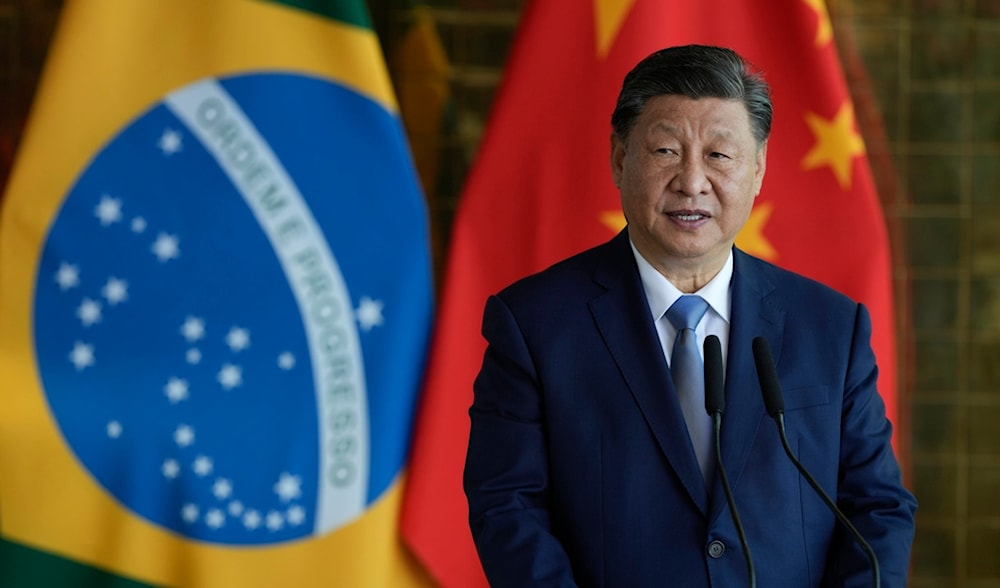China-Brazil agricultural trade to speed up amid retaliatory tariffs
China's retaliatory tariffs are expected to speed its pivot toward trade with Brazil, particularly for agricultural imports like soybeans.
-

China's President Xi Jinping speaks during a joint press conference with his Brazilian counterpart at the Alvorada palace in Brasilia, Brazil, Wednesday, Nov. 20, 2024. (AP)
China’s retaliatory tariffs announced Friday are expected to accelerate its shift to alternative agricultural suppliers like Brazil, a trend that began during President Donald Trump’s first-term trade war with Beijing.
Beijing rolled out sweeping countermeasures, including an additional 34% tariff on all US goods, on top of the 10-15% duties imposed in March on about $21 billion worth of US agricultural products.
"This is going to cost the US a lot of export business," said Jack Scoville, vice president of the Price Futures Group in Chicago. "We're pissing off everybody. That's the problem. Where are we going to turn if we've slapped everybody with tariffs?"
US soybeans felt the impact immediately when the most-active contract on the Chicago Board of Trade fell 3.4% to $9.77 a bushel, its lowest level on the 2025 chart.
"It is like shutting down all US agricultural imports. We are not sure if any imports will be viable with 34% duty," said a Singapore-based trader at an international company that sells grains and oilseeds to China.
A European trader echoed the concern, noting the EU’s expected retaliation. "It's all about soybeans. A major concern is if there is no agreement before the new crop for US soy, adding that "As a big picture conclusion, all this trade war is bearish US ags and bullish other origin ags."
March’s tariffs had already accelerated China’s shift toward Brazil, which is now on track for a record-breaking second-quarter surge in soybean exports to China.
"Brazil will be by far the main beneficiary, the biggest supplier that can replace US soybeans to China. But others could benefit too, including Argentina and Paraguay. On wheat, Australia and Argentina should benefit," said Carlos Mera, head of Agricultural Market Research at Rabobank.
Sol Arcidiacono of HedgePoint Global Markets said that South American soybean prices will likely remain strong: “The basis for South American soybeans will get stronger for the full year, despite seasonality and record crops as the trade war escalates.”
She added that “current geopolitics will likely drive an increase in acreage for soybeans, mainly in Brazil, where expansion had been slowing lately.”
China retaliates
China announced that it plans to impose a new tariff on imports from the United States in response to the reciprocal tariff of 34% imposed by Trump on Beijing, announced on Wednesday.
"For all imported goods originating from the US, an additional tariff of 34 percent on top of the current applicable tariff rate will be imposed," the Chinese Ministry of Finance stated, and the tariff, which matches the US rate, will be implemented on April 10.
China condemned Trump's decision, “This practice of the US is not in line with international trade rules, seriously undermines China’s legitimate rights and interests, and is a typical unilateral bullying practice,” China’s State Council Tariff Commission said in a statement.
In addition to the new tariff, China has imposed export controls on seven rare earth minerals, including gadolinium, which is used in Magnetic Resonance Imaging (MRI), and Yttrium, which is commonly used in consumer electronics.
Moreover, China added 11 companies to its unreliable companies list, including US drone manufacturer Skydio, and imposed controls on some Chinese exports to 16 US companies.
Read more: US trade partners threaten to escalate trade war amid tariff onslaught

 4 Min Read
4 Min Read








